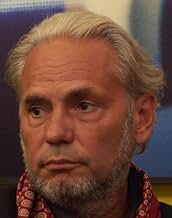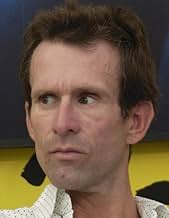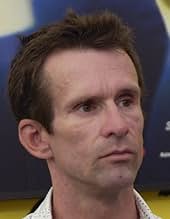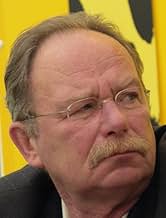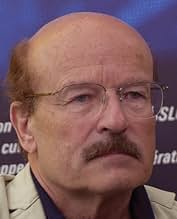VALUTAZIONE IMDb
7,0/10
1997
LA TUA VALUTAZIONE
Aggiungi una trama nella tua linguaA drama loosely based on Jean Bernard's Nazi-era prison diary.A drama loosely based on Jean Bernard's Nazi-era prison diary.A drama loosely based on Jean Bernard's Nazi-era prison diary.
- Regia
- Sceneggiatura
- Star
- Premi
- 6 vittorie e 13 candidature totali
Vladimír Fiser
- Bischof Kozal
- (as Vladimir Fiser)
Peter Varga
- Józef (Polish Inmate)
- (as Petr Varga)
Recensioni in evidenza
The basic idea of this film is rather interesting. There was a catholic priest from Luxembourg imprisoned in the concentration camp Dachau during the Second Word War. He wrote a diary describing daily camp life. But for 9 days he is allowed to get back to his family for the funeral of his mother. It is known that he is interrogated by the GESTAPO. But he does not tell anything about it in his diary. So the film fills the historic gap with some fiction. We are told the story of a young Nazi official who tries to convince the priest to get his bishop to stop his passive resistance. So far so good. Quite conceivable that this actually happened. But. The whole thing is just not believable. The dialogs are weak, so far as there are dialogs at all. Most of the time Uli Matthes, who is supposedly one of the best German actors, is silent. You just see his face with an expression that you can put anything into. That of course is impressive. But it is not acting. We are told that he is brilliant, but it is never shown. He just has switched uniforms. He recently played Goebbels in the Downfall. What I had expected was some real intellectual argument between the Nazi guy and a catholic intellectual. There is next to nothing of it. Some argument about Judas but it is never clear what this is supposed to proof. There is never a moment of doubt about the outcome of the "intellectual battle". And because of this the film is a failure. Very good music, though and some good scenes of the concentration camp life.
I do not at all understand how someone can dismiss this film as a "Catholic propaganda movie". That's utter rubbish. I was raised catholic and have converted to paganism but this was still an excellent movie. It does not try to push the catholic faith onto anyone. What it is about is, simply, one man's principles. In an awful time, in the face of torture and abuse, when he is being confronted with the most persuasive arguments and when no one could blame him for taking the easy way out and saving himself, can he stand by what he believes? Will he save himself and then live the rest of his life hating himself for it? This movie was completely engrossing from beginning to end. It absolutely gripped my emotions and my mind and held me riveted. It also left me thinking about it and haunted by it long afterward. I cannot recommend this movie highly enough. Brilliant. I found myself both attracted to and repelled by the character of the Nazi sent to persuade him. Amazing subject matter beautifully executed.
In World War II, after a period living hell on earth in the concentration camp of Dachau with other catholic priests, Father Abbé Henri Kremer (Ulrich Matthes) gets a nine days leave to return to his home town for his mother's funeral. Along this period, the SS Gestapo lieutenant Gebhardt (August Diehl) tries to persuade Henri, who was born in silver-spoon and member of an influent Luxembourgian family, to convince the local bishop to give-up resisting to the Germans and write a letter to the Vatican in the name of the Catholic Church of Luxemburg convincing the Pope to support Hitler and the Nazi regime. The ambivalent Henri questions himself and the bishop what he shall do.
Based on a true story, "Der Neunte Tag" is an awesome movie and another impressive example of the powerful German cinema, of which I am a great fan. The philosophical duel between the characters of Ulrich Matthes and August Diehl is simply fantastic, with magnificent silence and dialogs. Sometimes, silence associated to the expression of the face is more significant than words. The direction is stunning and very realistic, particularly in the concentration camp; the music score and the cinematography are very beautiful; and the performances are perfect, with the two lead actors deserving nominations to the Oscar. My vote is nine.
Title (Brazil): "9o Dia" ("9th Day")
Based on a true story, "Der Neunte Tag" is an awesome movie and another impressive example of the powerful German cinema, of which I am a great fan. The philosophical duel between the characters of Ulrich Matthes and August Diehl is simply fantastic, with magnificent silence and dialogs. Sometimes, silence associated to the expression of the face is more significant than words. The direction is stunning and very realistic, particularly in the concentration camp; the music score and the cinematography are very beautiful; and the performances are perfect, with the two lead actors deserving nominations to the Oscar. My vote is nine.
Title (Brazil): "9o Dia" ("9th Day")
It showed just all the considerations that the Vatican and the clergy had to make and how complicated and not black and white their decisions were based upon. Not everything is as obvious as it seems. And it was not a Catholic based excuse movie for decisions made, it was just the facts. And it wasn't just the church that had to make these difficult considerations in WW2, but many governments and institutions. When your dealing with a madman who can like current day Putin, kill tens of and hundreds of thousands of people because of a single slight, you certainly have to be careful in your decisions. Just as the NATO decision on a no fly zone over Ukraine decision is. Sure we want to do it but is it worth starting WW3 over? Decisions I'm certainly glad I'll never have to make.
7nmuk
This movie has been unduly panned by IMDb critics as being Catholic propaganda, when there is hardly any. It's actually an exploration of questions on faith and morality, viewed from the perspective of Rev. Henri Kremer, a priest who has been "on leave" from Dachau to convince the Bishop of Luxemburg to support Nazism, who has been a silent opponent all throughout. At one point the film even mentions that the Pope however congratulated Hitler on his birthday - that clearly indicates the acquiescence of the Catholic world - to me that's quite the opposite of propaganda.
**** SOME SPOILERS AHEAD **** The movie chronicles each of the 9 days that Rev. Kremer is allowed, and his conversations with Gestapo officer Gebhardt. When Kremer fails to convince the Bishop, he is persuaded to write a memo himself, given his own respectability due to his family status. In return he can have all the priests in Dachau released. Kremer at one point thinks he is being like Judas betraying the Christian cause (also to be noted that his personal cash upon release amounted to 30 marks), which Gebhardt, a former theology student himself, argues is a necessary evil, because without Judas there would be no martyrdom of Christ, and hence no Christianity. Rev. Kremer also learns that by giving Nazi policies the official blessing of Catholicism, he can be responsible for the deportation of thousands - although some 40 priests could be let go from Dachau. The resulting dilemma of Kremer dominates the movie.
Ulrich Matthes is very convincing in the role of Kremer with his sunken cheeks and eyes, and watch the young actor August Diehl in the role of Untersturmfuehrer Gebhardt.
**** SOME SPOILERS AHEAD **** The movie chronicles each of the 9 days that Rev. Kremer is allowed, and his conversations with Gestapo officer Gebhardt. When Kremer fails to convince the Bishop, he is persuaded to write a memo himself, given his own respectability due to his family status. In return he can have all the priests in Dachau released. Kremer at one point thinks he is being like Judas betraying the Christian cause (also to be noted that his personal cash upon release amounted to 30 marks), which Gebhardt, a former theology student himself, argues is a necessary evil, because without Judas there would be no martyrdom of Christ, and hence no Christianity. Rev. Kremer also learns that by giving Nazi policies the official blessing of Catholicism, he can be responsible for the deportation of thousands - although some 40 priests could be let go from Dachau. The resulting dilemma of Kremer dominates the movie.
Ulrich Matthes is very convincing in the role of Kremer with his sunken cheeks and eyes, and watch the young actor August Diehl in the role of Untersturmfuehrer Gebhardt.
Lo sapevi?
- BlooperWhile their fellow-prisoner is being crucified, the priests are singing the hymn "Pange, lingua, gloriosi" by Thomas Aquinas (1264). However, they are singing a German version of this song, which was not in use before 1969. In addition, even if they happened to know a German version, it would be more likely for them to sing the original Latin version, as there were priests from all over Europe imprisoned in this block.
- ConnessioniReferenced in Una parola può cambiare tutto - Yes Man (2008)
- Colonne sonoreConcerto Grosso No. 1
Music by Alfred Schnittke
I più visti
Accedi per valutare e creare un elenco di titoli salvati per ottenere consigli personalizzati
- How long is The Ninth Day?Powered by Alexa
Dettagli
- Data di uscita
- Paesi di origine
- Sito ufficiale
- Lingue
- Celebre anche come
- The Ninth Day
- Luoghi delle riprese
- Aziende produttrici
- Vedi altri crediti dell’azienda su IMDbPro
Botteghino
- Lordo Stati Uniti e Canada
- 72.888 USD
- Fine settimana di apertura Stati Uniti e Canada
- 8786 USD
- 29 mag 2005
- Lordo in tutto il mondo
- 135.311 USD
- Tempo di esecuzione
- 1h 38min(98 min)
- Mix di suoni
- Proporzioni
- 1.85 : 1
Contribuisci a questa pagina
Suggerisci una modifica o aggiungi i contenuti mancanti




